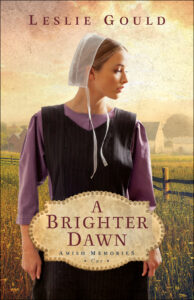Welcome Leslie. Let’s begin with a learning about your new novel, A Brighter Dawn?
A Brighter Dawn is a dual-time story, starting with Ivy Zimmerman, a young Mennonite woman from Oregon whose parents are killed in a tragic accident. She and her younger sisters are sent to Lancaster County to stay with their Amish paternal grandparents, who they hadn’t met until their parents’ funeral.
Two things keep Ivy going—an upcoming trip to Germany for a Mennonite youth gathering and her elderly aunt’s story of Clare Simons, another young girl who visited Germany in the late 1930s. In Germany, the evidence surrounding Ivy’s parents’ accident starts to unravel. Inspired by the past, Ivy returns to Oregon to seek the truth.
A Brighter Dawn is book one in your new AMISH MEMORIES series. Can you share about your inspiration for this series and the connecting element that ties each book in the series together?
Two things inspired me as I began to imagine the AMISH MEMORIES series. The first were my father’s scrapbooks from the late 1930s and 1940s, filled with photos, clippings, and other items. I wondered what it would be like for someone who grew up Anabaptist and never knew her family’s stories to be shown scrapbooks from seventy-five years ago. What if those stories—in a non-resistant family—included the build-up to World War II, the war, and the aftermath?
The connecting thread between each of the three books in the series is memories. What memories stay with us? How do we preserve them? What do we do with the memories that bring us shame? Why are collective memories—among families and communities—so important? Many of the memories in the stories start in the scrapbooks that Rosene, an elderly aunt in the story, has protected through the years. But, ultimately, the sisters in the stories must decide what memories they’ll carry forward, both from their family’s history and their own personal lives.
A Brighter Dawn addresses themes such as the temptation to compromise principles for political/societal stability. Can you tell us a little more about how this idea comes into play in the life of your protagonist, Ivy?
A large portion of German Mennonites supported Hitler and the Third Reich during the 1930s and into World War II because they perceived the stability offered by German Nationalism as protection for their families, their communities, and their faith. Communist Russia collectivized Ukrainian Mennonite farms and persecuted Mennonites for their faith. Then Stalin purposefully starved many in the early 1930s as a power grab. All three strikes contributed to the German Mennonites fearing communism and embracing fascism instead. As Ivy hears Clare’s story, she realizes she’s been making compromises as far as her own perceived social stability, the truth around her parents’ death, and the safety of others in her community, and she vows to seek the truth and live more authentically.
This novel is set during an interesting period of time in world history. Can you tell us a little bit about the historical events surrounding the novel’s plot?
In the historical thread of the story, Clare Simons travels to Germany in 1937 and ends up caring for her twin cousins, who both have epilepsy. Their father, a Mennonite man working with the Nazi party to “protect” other Mennonites, allows the girls to be part of a study overseen by Nazi doctors. Clare realizes, as she hears of camps for the disabled, that the twins are in danger and that she must come up with a plan to save them.
In the nearly two-year period of the historical setting, Germany annexed Austria; the Munich Agreement was signed by Britain, France, Germany, and Italy, forcing Czechoslovakia to surrender its border region (the Sudeten) to Nazi Germany; and the November 1938 Pogroms, later named Kristallnatch (Night of Broken Glass), took place in Germany and Austria. Soon after, Germany and Russia formed an alliance and then Germany invaded Poland in September 1939, which started World War II. So, yes, it was definitely an interesting period of time with a lot going on!
Was there anything that you found particularly interesting in your research that you included in your book?
One of the things I knew, but that impacted me more profoundly now, was how widely fascism was embraced during the 1930s. The world was still recovering from the Great War when the Great Depression began, and governments were struggling to provide for and take care of their people. Many criticized democracies as being too slow and cumbersome to get anything done, and embraced authoritarian governments, including fascism. Democracies died from South America to Europe to Asia.
The United States wasn’t immune from the burgeoning sentiment, although—thankfully!— democracy held. Well-known Americans, including Charles Lindbergh and Henry Ford, spouted anti-Semitic rhetoric and support for Nazi ideals, which legitimized the ideology to some. In February of 1939, the German-American Bund, a US fascist group that embraced the Nazis, held a rally for over 22,000 in Madison Square Garden, complete with Nazi imagery. My research reminded me how precarious governments “of the people, by the people, for the people” truly are and how important it is to work together to preserve them.
It might surprise some readers, but Amish fiction is a widely popular and enduring category in the world of story. What do you think readers find most appealing about stories featuring the Amish and their way of life?
I think the simplicity of the Amish way of life appeals to my readers. I know as I read (and write) Amish fiction I’m transported to a much simpler time. I often “find” myself on my aunt and uncle’s farm or my grandparents’ farm or on the farms of friends from my childhood. Yes, they all had electricity, but so many other things were similar to the Amish today. Lots of hard work. Cows to milk and a big garden to tend to. Field and pasture work. Sewing and canning projects. Devotions after breakfast. No technology. Time spent on the porch visiting or reading. Few trips to town.
I think in our chaotic world, we all crave time away from the busyness and an escape to simpler times. That said, my Amish dual-time stories can get pretty complicated, but more because of the plots than the settings!
What do you hope readers take away from this story?
I want my readers to value their own memories and the collaborative memories of their families, and to think about how to make memories, preserve them, and then pass them on. Studies have shown that people are happier if they hold a more positive view of the past. But I also want readers to think about how to process and pass down sad memories too, knowing they are also important to future generations and can lead to honest conversations, inspire the next generation to do the right thing, and even become cautionary tales.
Can you share what you’re working on next?
I’m currently working on the second book in the series, which has the working title The War Comes Home. Brenna, Ivy’s middle sister, is the protagonist of the contemporary story and Martha, Clare’s sister, is the heroine of the historical story. Both deal with the trauma and fallout of war as they navigate threats to the family businesses, along with caring for those they love.
How can readers connect with you?
You can find me at lesliegould.com (lesliegould.com/). I love to do giveaways, so make sure and sign-up for my newsletter! You can also find me on Facebook (facebook.com/lesliegouldauthor ) and Instagram (instagram.com/lesliegouldwrites/).
Thank you so much for joining us today, Leslie!
Reader’s, A BRIGHTER DAWN releases today!! Here’s a quick look:::::
 Ivy Zimmerman is successfully navigating her life as a young Mennonite woman, one generation removed from her parents’ Old Order Amish upbringing. But when her parents are killed in a tragic accident, Ivy’s way of life is upended. As she deals with her grief, her younger sisters’ needs, the relationship with her boyfriend, and her Dawdi and Mammi’s strict rules, Ivy finds solace in both an upcoming trip to Germany for an international Mennonite youth gathering and in her great-great-aunt’s story about Clare Simons, another young woman who visited Germany in the late 1930s.
Ivy Zimmerman is successfully navigating her life as a young Mennonite woman, one generation removed from her parents’ Old Order Amish upbringing. But when her parents are killed in a tragic accident, Ivy’s way of life is upended. As she deals with her grief, her younger sisters’ needs, the relationship with her boyfriend, and her Dawdi and Mammi’s strict rules, Ivy finds solace in both an upcoming trip to Germany for an international Mennonite youth gathering and in her great-great-aunt’s story about Clare Simons, another young woman who visited Germany in the late 1930s.
As Ivy grows suspicious that her parents’ deaths weren’t, in fact, an accident, she gains courage from what she learns of Clare’s time in pre-World War II Germany. With the encouragement and inspiration of the women who have gone before her, Ivy seeks justice for her parents, her sisters, and herself.






